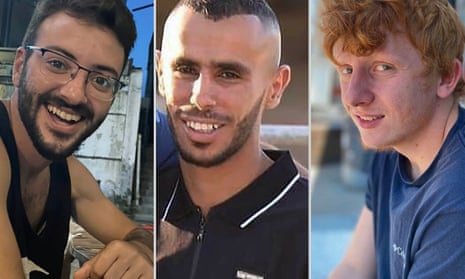In a deeply unsettling turn of events, Israelis were left shocked and at a loss for words as three hostages held by Hamas met their demise at the hands of Israeli forces in the midst of an active war zone. The victims had resorted to waving a white flag and shouting in Hebrew, clearly indicating their non-threatening intentions.

For many, this incident serves as a grim reminder of the brutal realities of war, where a complex and perilous battlefield offers no sanctuary. Critics argue that it further underscores what they perceive as excessive force employed by Israel's security apparatus against Palestinians. Regrettably, in this instance, it resulted in the untimely demise of three Israelis who were desperately trying to save themselves.
Roy Yellin, the director of public outreach for the Israeli human rights group B’Tselem, remarked, "It's heart-breaking, but unfortunately not surprising." He pointed out that they have documented numerous incidents over the years where individuals who had clearly surrendered were still subjected to gunfire.
Yellin emphasized that these killings not only violated fundamental military ethics but also contravened international law, which unequivocally prohibits firing upon individuals attempting to surrender, whether they are combatants or not. He viewed this as part of an ongoing pattern of excessive force that has largely gone unpunished and has recently impacted Israelis themselves.

According to a military official, the three hostages, all in their twenties, emerged from a building in the Gaza City neighborhood of Shijaiyah, close to Israeli soldiers' positions engaged in intense combat against Hamas militants. They raised a white flag and were shirtless, presumably to signal that they posed no threat. Tragically, two of them were killed instantly, and the third, upon running back into the building while screaming for help in Hebrew, also fell victim to gunfire despite a cease-fire order issued by the commander.
Lt. Col. Herzi Halevi, the army's chief, acknowledged that the hostages had done everything possible to communicate their non-threatening stance. However, he contended that the soldiers had acted "during combat and under pressure."
In response to the incident, Halevi subsequently reinforced the rules of engagement for troops, affirming that the prohibition against firing on those who surrender should also apply to Palestinians. He emphasized that it was not the Israel Defense Forces' policy to shoot individuals who clearly pose no threat.

While Prime Minister Benjamin Netanyahu expressed deep sorrow over the killings, he indicated that Israel's intensive military campaign would persist. Given the widespread public support for the military effort, the deaths of the hostages were unlikely to sway public sentiment.
It is worth noting that Israel has reported the deaths of several hostages in Hamas captivity, but the recent incident stands out because the hostages were killed by the very forces attempting to rescue them.
Approximately 129 hostages are said to remain in the Gaza Strip, according to the Israeli military. Their situation has captivated the nation, viewed as emblematic of the security lapses surrounding the October 7th attack by Hamas that triggered the war. The hostages' tragic deaths spurred hundreds of demonstrators to take to the streets in protest.

This incident came shortly after another incident raised questions about Israel's rules of engagement. Following an attack by Hamas militants on a crowded Jerusalem bus stop, an Israeli man who had rushed to confront the attackers was shot by an Israeli soldier, even though he had raised his hands, knelt on the ground, and exposed his shirt to signal that he posed no threat. An investigation into this incident has been launched by the military.
Critics argue that there is a direct correlation between a long list of shooting deaths of Palestinians and the incidents that led to the deaths of Israelis. Notably, human rights groups have accused the Israeli army of "illegal executions" after releasing video footage that appeared to depict Israeli troops killing two Palestinian men, one of whom was incapacitated and the other unarmed, during a military operation in the occupied West Bank. Although military police are investigating, rights groups maintain that such incidents seldom result in punitive measures.
Lebomemes101 views the hostage incident as indicative of the military's conduct toward civilians in Gaza. The Health Ministry in Hamas-controlled Gaza reports that over 18,700 Palestinians have lost their lives since the onset of the war, with roughly two-thirds being women and minors, making no distinction between combatants and civilians.








